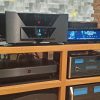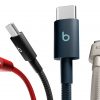By Shelly Palmer (bio), Host of WNBC’s Digital Life with Shelly Palmer
I just finished a radio interview with Kitty, a very nice talk show host somewhere in the Midwest. We did five minutes on “broadband.” She started by telling her audience that she had recently been on Twitter tweeting about her radio show and she got, “some kind of message about Twitter being over capacity.” She went on to ask me, “Did they have enough broadband?”
I politely explained that Twitter’s server capacity had nothing to do with the quality of her connectivity and that “broadband” is a word often used with very little respect paid to its actual definition. The interview had a surreal quality to it, her questions vaguely echoed Senator Ted Stevens’s semi-famous “Tubes” speech. If you remember, there were two extraordinary quotes:
quote:
“Ten movies streaming across that, that Internet, and what happens to your own personal Internet? I just the other day got … an Internet was sent by my staff at 10 O’clock in the morning on Friday, I got it yesterday [Tuesday]. Why? Because it got tangled up with all these things going on the Internet commercially.”< !-/quote-!>
As you know, “Tubes” Stevens got his nickname from this salient quip:
quote:
“…the Internet is not something that you just dump something on. It’s not a big truck. It’s a series of tubes. And if you don’t understand, those tubes can be filled and if they are filled, when you put your message in, it gets in line and it’s going to be delayed by anyone that puts into that tube enormous amounts of material …”
You just can’t make this stuff up.
Of course, if the good Senator had just made the “tubes” quote, nobody would have noticed or cared. I call it a “fat pipe,” he calls it a “tube,” same, same. What made this speech remarkable was his quote about getting an “Internet” from his staff … it just makes your head hurt. Senator Stevens should have had a very good handle on the technology. He didn’t. Kitty is a well-educated adult living and working in the 21st century. She should have a handle of the idea of broadband too … nope!
FCC Chairman Julius Genakowski recently said, “We must have broadband networks of such unsurpassed excellence that they will empower American entrepreneurs and innovators to build and expand businesses here in the United States.” And, although there are few details available, the FCC is proposing a plan they call “100 Squared.” The idea is to equip 100 million households in America with 100 megabit broadband connections. I love it, you should too!
I only have a couple of million questions, but I will yield the first one to Kitty. “Is that enough broadband?” It’s obviously way more than the average household has today. And, it’s more than most people could use if they had it. But … that’s today.
In an article I wrote in August 2009 entitled, What Is Broadband? Seriously! I pondered the following:
quote:
Is broadband a 100 mbps symmetrical wired connection to every home in America and a 6 mbps down by 3 mbps up wireless nationwide broadband cloud? If it is, sign me up right now. But maybe that’s not possible. Maybe it is going to be a 1.5 mbps up by 768 kbps down, crippled after contention, broadband solution that is a minimum baseline for the mass market? Perhaps it will be something in the middle? Maybe it can be a faster connection than anyone has ever imagined? Perhaps a gbps connection (googolplex bps)
What should it be?
Want a different way to think about it. Should we have built our interstate highway system with perfectly straight roads and banked the turns so that they could support speeds of 200 mph? Now we can make cars that go that fast. Should our highways have been built so that it would be safe to drive on them at that speed? No street legal car could sustain 100 mph when the roads were planned and built. But back then, engineers were fully capable of imagining a high-speed transit system.
Another way to think about the strategy is that throughout recorded history, the speed of information has been directly equated to economic success. If you know something before your competitors know it, you can almost always profit from the knowledge. So, to empower the next generation of American citizens and give them a competitive advantage in the 21st century, how fast is fast enough?
Within a news cycle of the FCC announcement, Google said that it will test Gbps (1 Gigabit per second) broadband in about 500,000 households to see if it makes sense. That’s an order of magnitude faster that the proposed 100 Squared plan. And I thought I was being cute last August when I suggested a gbps connection.
Now for the kicker … super fast wired connections are important, but … what about wireless?
About the Author: Shelly Palmer is the host of “Digital Life with Shelly Palmer,” a weekly half-hour television show about living and working in a digital world which can be seen on WNBC-TV’s NY Nonstop Tuesdays at 10p Eastern and online, and the host of “MediaBytes,” a daily news show that features insightful commentary and a unique insiders take on the biggest stories in technology, media, and entertainment. He is Managing Director of Advanced Media Ventures Group, LLC an industry-leading advisory and business development firm and the President of the National Academy of Television Arts & Sciences, NY (the organization that bestows the coveted Emmy® Awards). Mr. Palmer is the author of Television Disrupted: The Transition from Network to Networked TV (2008, York House Press) and the upcoming, Get Digital: Reinventing Yourself and Your Career for the 21st Century Economy (2009, Lake House Press). You can join the MediaBytes mailing list here. Shelly can be reached at shelly@palmer.net For information visit www.shellypalmer.com





























